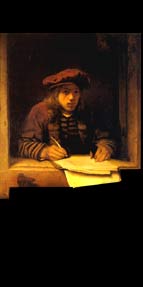 |
 |
 |
 |
 |
|
| FROM "BAD" TO WORSE |  |
|
Leos Carax's Miserable Journey
by Sean Nelson
Mauvais Sang (Bad Blood)
Plays Fri-Sun June 8-10 at the Little Theatre.
Despite its dour title, Mauvais Sang (Bad Blood, 1986) is a rapturous film, spilling over with director Leos Carax's enthusiasm for the possibilities of cinema. Within that rapture, however, lies a deeply French pessimism about the realities of life and love. This apparent paradox--hope holding hopelessness--fills Mauvais Sang with a litany of seeming contradictions (it's both grave and whimsical; both romantic and cynical) that ultimately yield a film as physically satisfying as a good cry. Sang's inherent sweetness is made all the more bitter by the knowledge that Carax himself, 15 years and two films later, seems to have forsaken hope as an artistic avenue and fully embraced the rapture of despair.
Mauvais Sang tells the story of Alex (Denis Lavant), a simian young card hustler who is coaxed into a heist after his father is murdered. His father's partners, Marc and Hans, offer him $150,000 if he can use his quick hands to steal the vaccine for "STBO," a retrovirus that attacks couples who make love without passion. He reluctantly agrees, dumping his doting young girlfriend Lise (Julie Delpy) and heading off to the city for a life of crime. There, he meets and instantly falls for Anna (Juliette Binoche), Marc's much younger lover. As they prepare for the heist, Alex attempts to woo Anna, who is charmed but steadfast in her love for the older, far more aloof Marc, whose health seems to be mysteriously deteriorating (could it be STBO?). Anna's rejection, coupled with the sudden reappearance of Lise, drives Alex to distraction, which causes a severe injury to his hands, which in turn imperils the mission that brought him there in the first place. The results are both predictably tragic and unexpectedly uplifting.
Up to the moment when Alex meets Anna, the film is a study in implied motion. Carax binds the actors in static positions and lets the camera suggest movement (along the length of a phone cord, across a face in tight close-up, amid the rapid shuffling of a deck of cards) within confined space. Even Anna's first appearance--in the distorted mirror of a chugging city bus--is stilled. But at the moment Alex falls for her, both film and character bust loose. As the radio plays the stuttering guitar intro to David Bowie's "Modern Love," Alex takes off sprinting down the fabricated city streets and the camera dollies along, taking in the bursts of red that flare behind him as he runs past endless gray walls in a fever. The shot is long and exhilarating, a contemporary response to the traffic jam from Godard's Weekend, and as perfect an evocation of love's first blush as has ever been filmed. The Godard influence hardly ends there; the entire sequence that follows is straight out of A Woman Is a Woman (young Binoche had all the wonder of Anna Karina in 1961), redolent with the same romantic fabulism, and tempered by the same air of impending disappointment. At one point while on the phone to her, Alex tries to spy Anna in the hotel across the street. The cord is too short, so he twists around and leans backwards, suspended at a 45-degree angle, held only by the phone wire. In the full tizzy of romance--both the characters' and the filmmaker's--no contrivance is too ridiculous.
The giddiness of this prolonged (and ultimately unsuccessful) seduction is balanced by scenes of sober formalism, peppered throughout with absurd and poetic antiformal outbursts. Again, Carax's enthusiasm for the medium is boundless. Given the conceit of the disease itself (a virus that knows how you feel), it's clear that anything goes. And everything does. Whether parachuting from an airplane, speeding down the road on motorcycles, or locked in discussion, the characters are held in a relentlessly curious frame, one that never fails to capture the quiet beauty of humans on the eternal verge of closeness.
After Mauvais Sang, however, the hope surrounding Carax's hopelessness would diminish to a point of imperceptibility, as his style became more classical and his stories grew bleaker and bleaker. His next film was the unremittingly grim Les Amants du Pont-Neuf (The Lovers on the Bridge, 1991), which functions as a quasi-sequel to Sang, reuniting Levant (again playing a guy named Alex, this time a drug-addicted, suicidal homeless man) and Binoche (a nearly blind homeless woman), who find a compromised variant of love among the concrete ruins of the oldest bridge in Paris. Next came Pola X (1999), a morbid and graphically sexual adaptation of Melville's Pierre, or the Ambiguities, which posits that the only logical outcome of a life in art is despair, dissolution, and death.
When asked where he'd gone for the eight years between Bridge and Pola X, Carax tersely replied, "To hell." "No project," he elaborated, "could counteract my disgust for cinema." Though both his later films are beautiful, compelling works, they spill over with Carax's professed disgust--not for cinema, but for the misery of life itself. In their dark shadow, the infectious joy of Mauvais Sang becomes all the more devastating.
|
|
|
|
